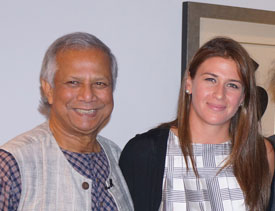How Extended Time Improved More than Just Test Scores

Learning is not a game with set rules. You can take any path you want to get to the finish line.
This nightmare might sound familiar to you:
You walk into an exam. You sit down. You stare at the sheets of paper in front of you as you listen to people scribble answers to questions that you yourself have no idea how to answer. You can hear the clock ticking away. When it seems like an eternity has passed, the teacher calls time. You hand in a piece of paper that may not be completely blank, but might as well be. The panic sets in. You can awake from this nightmare knowing that next time you will be prepared and you will be able to answer the questions. We’ll call this Nightmare Scenario Number 1.
Now imagine walking into an exam, knowing all the answers, but cognizant that you’ll never complete it in time. Rather than spend time answering the questions, you try to strategize about which questions you can answer the fastest, rereading each question a few times. In this scenario, which we’ll call “Nightmare Scenario Number 2,” you’re also dyslexic. So, not only do you have to decode the symbols on the page, you also have to work through the nerves you have from knowing that you have all this extra work to do while taking the test, but not the extra time. Since you’re not a professional spy, who is trained to decode under pressure, you take a little longer than usual to translate the words on the page. By the time you have figured out the questions you can answer the fastest, you have about half the time left. Even though you know the answers to more than half the questions on the test, you only have time to answer some of the questions. You leave feeling frustrated. You studied as hard as anyone else—probably harder—and you start to realize that no amount of studying can prepare you. You could have memorized the entire textbook. But you will never have enough time to translate your knowledge into coherent answers. Now imagine Nightmare Scenario Number 2 repeating, again and again.
You can see how no amount of extra time on tests solves the problems in Nightmare Scenario Number 1. If you don’t know the material, you can’t answer the questions, no matter how much time you have. But the problem is that often educators, students, and testing agencies don’t even consider that extra time might be a solution to Nightmare Scenario Number 2.
Extra time wasn’t the entire solution, but with it, I saw my confidence improve, and with that, so did my schoolwork.
Growing up as a dyslexic, whenever I sat down to take a test that was timed, I experienced Nightmare Scenario Number 2. Thankfully, I had a fourth grade teacher who saw things differently. She observed discrepancies in how I spoke in class with how I scored on tests. If my fourth grade teacher had not encouraged me to get extra time on tests, my self-esteem would have been eviscerated by the time I got to high school. After each test where I only answered half the questions correctly, I would spiral downward in a fit of never-ending self-doubt. My test scores would have sealed my fate. I would have given up on studying and neglected my schoolwork. I doubt I would have earned a college degree from a top-tier university or earned a graduate degree.
Thankfully, I did get extra time, not just in fourth grade, but continuing through my school career. But being given extra time didn’t mean that I was suddenly scoring perfectly on tests or I’d morphed into a super student who could overcome any level of difficulty with the special power of extra time. Yes, the extra time was helpful. It allowed me to read all the questions on a test and answer the ones I could. Some problems or questions I never could have answered, even if I had stayed there for two days, because I just didn’t know the answer. Extra time wasn’t the entire solution, but with it, I saw my confidence improve, and with that, so did my schoolwork.
I went from being in the worst reading group into the best reading group. I won’t lie; I did get a slight ego boost from moving up in reading groups. But reading groups end in high school; labels and petty behavior, however, begin in high school. So, my slight ego boost ended my freshman year, when labels, like getting extra time, took on much more significance.
There are no rules demanding you learn the materials by running around three bases. You may have to run around twelve.
Although my comments were always well respected in class, I didn’t want to be labeled as one of “those people.” “Those people” were the individuals who went into special rooms to take tests because there was something very wrong with them—so wrong that they couldn’t take tests in the same room as others.
I wasn’t officially diagnosed with dyslexia until my twenties, but I knew there was something wrong with me, after I had to go in for special testing beginning in kindergarten. I never got a clear diagnosis and I had no way to articulate my academic struggles as a child. When my friend came up to me during a calculus test, and said, “What? You don’t need extra time on that test. You’re smart. Why would you need it?” I had no witty response, no disguise that I could throw on and pretend it was some other girl who needed extra time. Being an already insecure teenage girl, prone to issues that most girls go through in high school, I began to doubt my own beliefs in needing extra time. In high school, everyone gets labels, and did I need to add “Girl Who Has Special Needs” to my name tag?

Naturally, when I began college, I was determined to start anew and not keep up the “special needs” label. After I did poorly on both a math test and an in-class essay for a history class (and history was always my strongest subject), I soon realized this might just be a label that would have to stick.
Since having taken tests both with regular time and with extra time in college, I can now clearly see the differences in how I approached tests and why I needed time. When I didn’t take the extra time, I didn’t reread questions. I rushed through math problems, not going back to fix mistakes in numbers where I may have flipped figures. For in-class essays, I jumped around from question to question like a neurotic mouse who keeps coming up against different parts of the wall, trying anything to find an escape route to exit the room. I wouldn’t take the time to read the questions carefully, to make sure that I was providing answers that were asked, or double back to read if I what I wrote reflected what I thought.
Making sure you wrote what you thought you wrote is huge for dyslexics. When dyslexics write they sometimes insert words that do not make any sense, but sound like a word that they want to use, or construe sentences whose grammatical structure is more similar to a Persian sentence. For those of you who do not read Persian or “dyslexic,” Persian is written in the opposite direction of English and the verb comes at the end of the sentence. Persian grammar is flexible, as is dyslexic grammar—English grammar, not so much. This is why dyslexics must always make sure they properly translate their ideas into English. With certain time constraints, this task is almost impossible for dyslexics.
My grades dramatically improved. Of course, this wasn’t only the result of getting extra time. It was also a result of my going into office hours twice a week with my calculus professor or making sure I went to extra hours with my history TAs to talk about the exam.
After failing to translate my language into the test language yet again, I filed the paper work I needed for extra time. My grades dramatically improved. Of course, this wasn’t only the result of getting extra time. It was also a result of my going into office hours twice a week with my calculus professor or making sure I went to extra hours with my history TAs to talk about the exam. If you recall Nightmare Scenario Number 2, when I didn’t have extra time on tests, I really believed I was an F student. But when I got the extra time, and even without the grueling, long office hours, I saw small improvements. These small improvements made me think, “Well, if I can get a B, why not work to get an A?” The extra time can only get a person so far. Trust me, extra time does not make you into a superhero where you can overcome any calculus or philosophical problem in a single leap. You either know the materials from learning them or you don’t. Believe me, there were tests when I had time and a half, and I wished I’d had regular time. When you are unprepared for a test, sitting through a three-hour exam while thinking about all the materials you should have studied is really not a whole lot of fun. If you don’t believe me, imagine Nightmare Scenario Number 1, where you show up to the test totally unprepared, except the clock never stops—that’s a REAL nightmare.

Allison, with her boss Nobel laureate professor Muhammad Yunus. Allison is Co-Founder & Executive Director at Grameen Research, Inc.
While the extra time on tests did raise my confidence, I still worried that my professors would see me as “special.” This was much worse than being labeled “special” by a 16-year-old boy who himself couldn’t score well on a test even if he was given 24 hours to take it. I would slowly approach professors after class or go during their office hours where I could discreetly ask for extended time. To my surprise, I never encountered a professor who gave me trouble asking for extended time. Instead, I got responses like: “Allison, don’t worry. My son needs extended time. I fully believe in it and I don’t even believe in timing tests anyway.” Then I had another professor who told me that all I needed was a written document. He asked if it was medical and I said, “Yes,” and supplied him with the documents. When I got all As in the class, he wrote me a great recommendation for graduate school. Clearly, my “special needs” had not affected his ability to judge my intellect or academic ability.
The extra time can only get a person so far. Trust me, extra time does not make you into a superhero where you can overcome any calculus or philosophical problem in a single leap. You either know the materials from learning them or you don’t.
I have two big regrets in college–and, no, neither of them is related to attending parties or my love life. Regret number one: Not asking for extra time sooner. Instead of getting the grades I was capable of, I allowed my insecurity to get the best of me, and this manifested itself in a poor GPA. Regret number two: Letting labels dictate how I perceived myself. Instead of worrying about whether I would learn the material or how I would perform on a test, I worried about what others thought about me. I also allowed myself to believe that these labels meant that my learning and test-taking abilities were inferior. “Different” does not mean inferior. I should have seen my abilities as a product of a different learning style that required me to do things in a different way, not in an inferior way. In fact, some of my best ideas came from addressing a question in a different way. I often hear that people who decided to do things differently made some of the best discoveries. I mean, after all, you can’t create revolutions or cause paradigm shifts by doing things the same way.
“Different” does not mean inferior. I should have seen my abilities as a product of a different learning style that required me to do things in a different way, not in an inferior way. In fact, some of my best ideas came from addressing a question in a different way.
Of course, I didn’t realize any of this until I started getting the results I wanted with extra time on tests. I began not only taking tests more seriously, but my studying, as well. Once I realized that I could score well on tests, I wanted to keep scoring well. This meant changing my studying habits, which also meant I processed materials in a more meaningful way. I suddenly had a deep and complex understanding of materials. This impressed my professors, even more than the numbers on top of the pages.
I also stopped worrying about how others looked at me. Instead, I focused on how I wanted to be seen. When I made a grammar mistake or I had to reread things, I knew it was just how my brain processed materials. Everyone has his or her own process. No one should be ashamed of having a process. Even athletes have a routine before they get up to bat or step onto the blocks. But, thankfully school is not a race. Learning is not a game with set rules. You can take any path you want to get to the finish line. There are no rules demanding you learn the materials by running around three bases. You may have to run around twelve. The good news is you will learn it. Given enough time, you might even learn it and get to the finish line.
by Allison Schwartz
Related


One Dyslexic’s Experience with Learning American Sign Language
CJ found learning ASL fairly easy. In each class he was given 45-50 vocabulary words to learn.
Read More
Giving Voice to a Young Person’s Dyslexia Journey
Jennifer realized she could help other kids—and their parents—by telling her own story, the story of a 12-year-old …
Read More
Life Lessons from a Lifelong Learner
Magical Thinking, Rage and Small Steps on the Dyslexia Journey By the Reverend Charles F. Harper, M.Div., Yale …
Read More